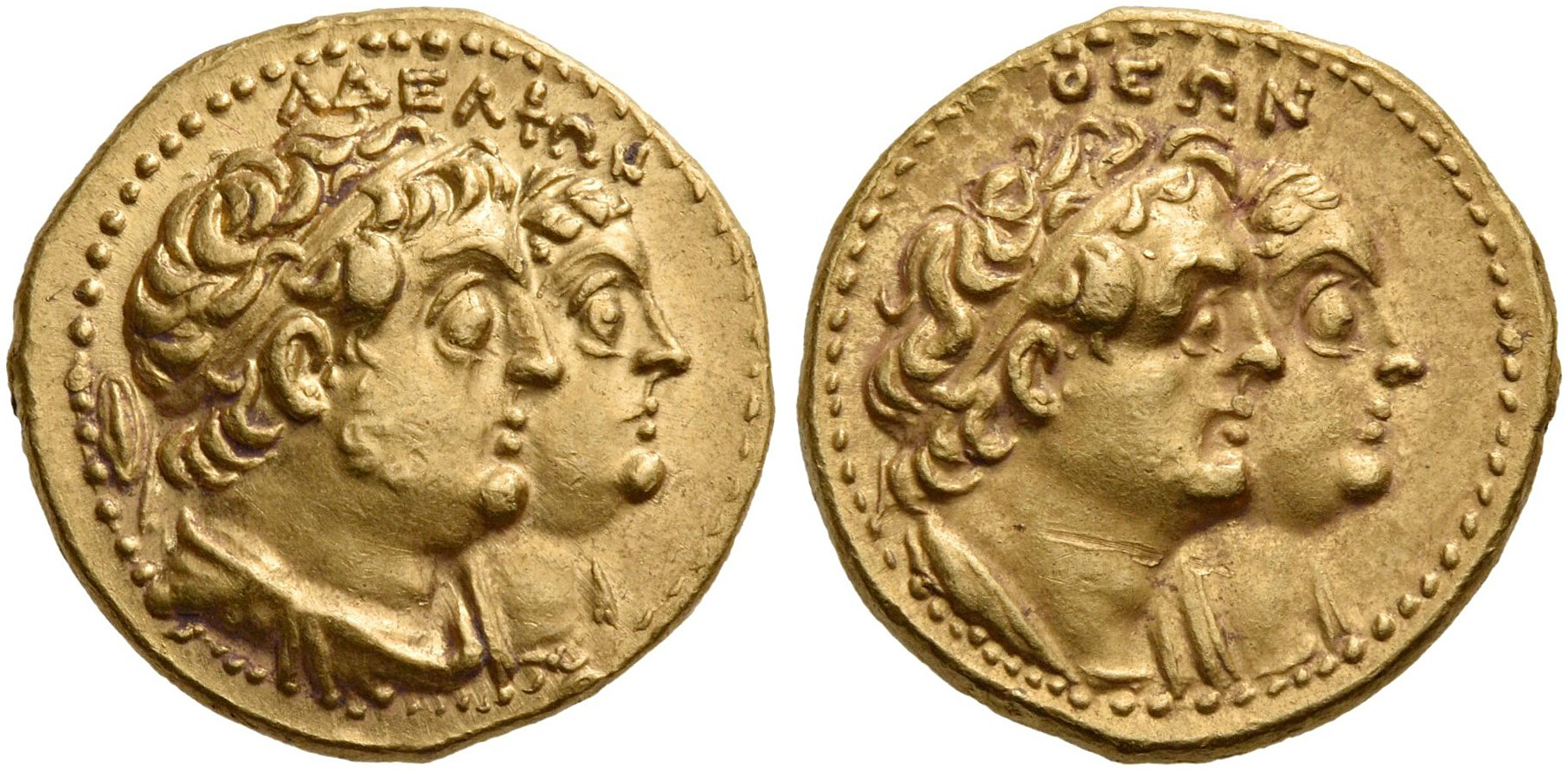S 2063 - Alexandria (Ptolemy II), gold, quarter mnaieia (272-260 BCE)
From SILVER
272 BCE - 260 BCE Gold 3,878 kg
Description
| ObverseInscription or printing placed on the obverse.: | ΑΔΕΛΦΩΝ (Greek).Jugate busts of Ptolemy II, diademed and draped, and Arsinoe II, diademed and veiled, to right, behind, Gallic shield |
| ReverseInscription or printing placed on the reverse.: | ΘΕΩΝ (Greek).Jugate busts of Ptolemy I, diademed and wearing aegis, and Berenike I, diademed and veiled, to right |
Mint and issuing power
| MintIdentifies the place of manufacture or issue of a numismatic object.: | Alexandria | Ancient regionAncient region.: | Egypt | Modern countryModern country: Egypt | AuthorityIdentifies the issuing power. The authority can be "pretended" when the name or the portrait of X is on the coin but he/she was not the issuing power. It can also be "uncertain" when there is no mention of X on the coin but he/she was the issuing power according to the historical sources: | Ptolemaic dynasty (323-30 BC), Ptolemy II Philadelphus (Ptolemaic king, 283-246 BC) |
Chronology
| FromIdentifies the initial date in a range assigned in a numismatic context. | 272 BCE | toIdentifies the final date in a range assigned in a numismatic context.. | 260 BCE | PeriodTime period of the numismatic object.: Hellenistic 323-30 BC |
Physical description
| MetalThe physical material (usually metal) from which an object is made.: | Gold |
Median weightMedian of the weights of numismatic objects (in grams). in grams | 6.95 | DenominationTerm indicating the value of a numismatic object. Examples: tetradrachm, chalkous, denarius.: | 1/4 mnaieia | StandardStandard.: | Ptolemaic |
Image

S2063 Egypt quarter manieia Theon Adelphon.jpg [1]
References
| Die study referencePublication of the study: | Olivier - Lorber 20131Olivier - Lorber 2013, p. 78, n° 393-397 | ||
| Coin series referenceReference to coin series study: | Sear II2Sear II, n° 7791 | ||
| Coin series web referenceCoin series web references: | |||
Obverse dies distribution
| FrequencyFrequency of specimen in distribution. ᵖ | Number of obversesNumber of obverse dies. ᵖ (o) | % (o) | Number of coinsNumber of coins. (n) | % (n) | Die nameName(s) of the die(s). |
| 2 | 1 | 50 | 2 | 40 | 1 |
| 3 | 1 | 50 | 3 | 60 | 2 |
| Total | 2 of 2 | 100 | 5 of 5 | 100 |
Reverse dies distribution
no distribution is available
Quantification
| Number of obversesNumber of obverse dies. ᵖ (o) | 2 | Number of singletons (o1)The number of singleton coins. ᵖ | |
| Number of reverse diesNumber of reverse dies. (r) | 4 | Number of coinsNumber of coins. (n) | 5 |
| Coins per obverse dieNumber of coins per obverse die. (n/o) | 2.5 | Coins per reverse dieNumber of coins per reverse die. (n/r) | 1.25 |
| Reverse per obverse ratioRatio of obverse dies divided by reverse dies. (r/o) | 2 | Percentage of singletons (o1)number of coins (n) divided by the number of singletons (o1) ᵖ | % |
| Original number of dies (O) (Carter 1983 formula)The estimation of the number of coins according to Carter 1983 ᵖ | 2.79 | Coins struck if 20,000 as average productivity per dieCoins made if the average productivity for obverses (according to Carter) is 20,000. ᵖ | 55,800 |
| Original number of dies (O) (Esty 2011 formula)The estimation of the number of coins according to the singleton formula in Esty 2011 ᵖ (O) | 3.33 | Survival rate if 20,000 as average productivity per dieSurvival rate if average productivity is 20,000. ᵖ | 0.00009 |
| Coverage (o = % of O) (Esty 1984 formula)Esty 1984 - coverage (% of O) ᵖ (o = % of O) | % | Die productivity if survival rate 1/2,000Average productivity if survival rate is 1/2,000. ᵖ | 3,584.23 |
| Weight of silver (in kg) if 20,000 coins per die (O = Carter formula)Carter 1983 * Median weight * 20000 (*10 if gold or electrum) ᵖ | 3,878 kg <br /> 3,878 kg | Die productivity if survival rate 1/5,000Average productivity if survival rate is 1/5,000. ᵖ | 8,960.57 |
Remarks
Most likely one single workstation